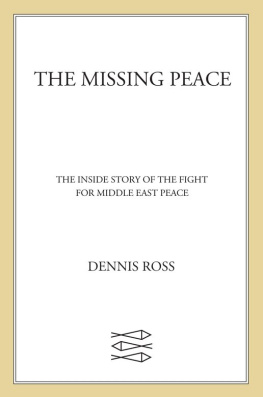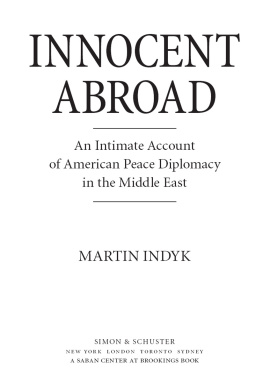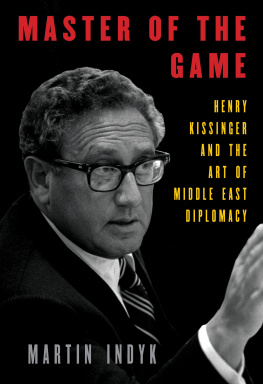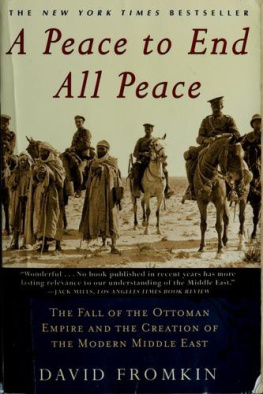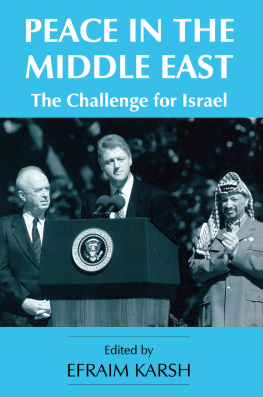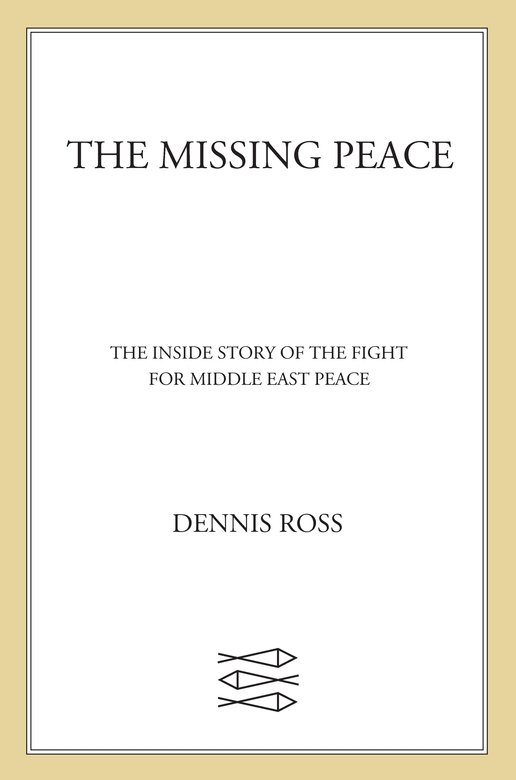The foundation of this book is a working record that I kept during my time as envoy. It was at the suggestion of Tom Friedman of The New York Times, who knows the value of firsthand experience, that I began to keep such a record: writing about my expectations before each trip and negotiating session, and writing afterward to describe what had actually happenedoften in the middle of the night between rounds of negotiations. I would note where what I heard matched my expectations, and I would try to account for the areas where it did not. In less stressful times, I would review the record, while constantly adding to it. Those with whom I dealt were struck by how I seemed to know every detail and was always able to quote what they had said back to them. And so the record became a useful tool in diplomacy; moreover, the act of writing it often gave me additional perspective and at times was a way for me to try to shape the day-to-day strategy.
The book, like the peace process itself, also reflects the unflagging efforts of many people. I owe a great deal to those who were my closest working companions. Aaron Miller, Gamal Helal, Nick Rasmussen, and Jon Schwartz worked from an extraordinary sense of commitment and beliefno trip was too hard, no work too demanding, no disruptions of their personal plans unacceptable.
Martin Indyk, too, was a kindred spirit throughout the process, and was particularly helpful during his tenures as U.S. Ambassador to Israel. Jill Indyk constantly had to accommodate our demands to use their residence for meetings, dinners, and late-night talks. Unfailingly, she did so with warmth and grace. Others like Toni Verstandig joined the team later, but energetically and selflessly contributed to our efforts.
Naturally, I owe a great deal to those who placed me in a position to shape and conduct our peace process diplomacy: President George H. W Bush, Secretary James A. Baker, President Bill Clinton, Secretary Warren Christopher, and Secretary Madeleine Albright. All of them did what they could to achieve Arab-Israeli peace, and all of them gave me the mandate that a negotiator needs. It was a privilege to work with them, and a stirring reminder of how leaders can be driven by a profound sense of purpose.
Over the years many others in the State Department and in our embassies throughout the Middle East and Europe helped facilitate our efforts. I shall always be grateful to countless other colleagues, too numerous to mention, who, no matter the time of day or night and no matter the need, lent their support to the diplomacy. Their work is often unseen and anonymous, and I thank them.
For support during the writing of the book, I owe a great deal to the Washington Institute for Near East Policy and its president, Fred Lafer, who welcomed me upon my departure from the government. No one could have designed a place with more support, collegiality, and intellectual stimulation from which to write. I am especially indebted to Robert Satloff and Patrick Clawson, the director and deputy director, for their support. David Makovsky, my Institute colleague and friend, also offered many constructive comments. At the Institute, a large number of research assistants and summer interns assisted in research and fact checking at different stages of this project, and I owe them all a debt of gratitude. In particular, I want to thank Jacqueline Kaufmann, who helped as I was organizing the book and its content; she worked tirelessly to both provide assistance on research and to manage many of the demands on my time in the early stages of the writing. Eran Benedek, Evan Langenhahn, and Michael Bergman picked up the work Jacqueline had done and organized the fact-checking effort, responding with skill and talent to any and all needs.
Ben Fishman, my research assistant, took on the onerous task of transforming a draft text into something like a final document: providing thoughtful comments, raising questions, helping with the editing and footnoting, arranging for maps to be made, and meticulously fact-checking the whole.
I am also very grateful to Marguerite Dale, my executive assistant. In the last two years when, during Rob Satloffs sojourn to Morocco, I served as the director of the Washington Institute, Marguerite juggled my various responsibilities there, at the Kennedy School and Brandeis, and on the roadmanaging to magically set aside time for me to write.
Jamie Rubin, who has an innate ability to get to the essence of an issue, made a number of extremely useful substantive and stylistic suggestions on an early draft. Robert Danin and Ken Stein also offered helpful comments. Two younger scholars, Leonard Wood and Eitan Goldstein, suggested sensible changes in the narratives chapter. And Issa Kassissich, one of my students at the Kennedy School, corrected a number of mistakes in the text.
It is my good fortune that Esther Newberg of ICM was a believer in this book from the beginning; she gave me an invaluable tutorial about the book publishing world, and was a constant source of support and sage advice.
Jonathan Galassi, publisher of Farrar, Straus and Giroux, was also an enthusiast for this project from the outset. He encouraged me to offer a historical context, not only to ground the story but to offer a broader perspective about what it reveals.
As the manuscript underwent revision, Paul Elie, senior editor at Farrar, Straus and Giroux, was as much a partner as an editor, tightening the narrative without doing damage to the story and its lessons. Best of all, he was a pleasure to work with. So was Pauls assistant, Kathryn Lewis, who worked diligently to transform the final manuscript into a book.
Above all, I thank my family. After the Hebron agreement, Bibi Netanyahu wrote a letter thanking me for my efforts and offering additional thanks to your long-suffering family. The book and the process it describes have been an odyssey not only for me, but for Debbie, Gabe, Rachel, and Ilana. Not only were they understanding of my absences and preoccupations, they, too, became deep believers in the quest for Middle East peace. It became as much their effort as mine, and, more than they will ever know or believe, they sustained me when I needed itand then sustained me all over again as I wrote about it. Rachel and Ilana particularly helped their technically challenged father with computer-related needs, and Debbie and Gabe offered valuable comments and editorial suggestions.
Through it all, Debbie always kept me grounded with her honesty, support, and love. I could not have done it without her.

